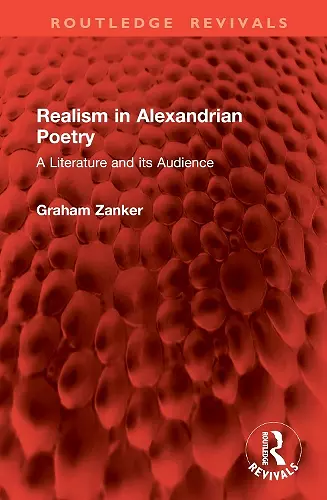Realism in Alexandrian Poetry
A Literature and its Audience
Format:Hardback
Publisher:Taylor & Francis Ltd
Published:31st Oct '24
Currently unavailable, and unfortunately no date known when it will be back

The poetry of Alexandria under the first three Ptolemies represents a second golden age of Greek literature. The eminence grise of poetic circles was Callimachus, whose poetic manifesto in favour of small scale, meticulously detailed and mannered works was to be of great influence on Augustan poetry in Rome. The stylistic aims of the Alexandrian poets have been much discussed, as has their reliance on literary tradition.
First published in 1987, Realism in Alexandrian Poetry covers less familiar ground. Taking the whole canon of Alexandrian poetry as his starting point, Dr Zanker surveys the use of the realistic mode in works like TheIdylls of Theocritus (were these real shepherds?), including such matters as the humorous elements of Callimachus Hymns, the love-story in Apollonius’ ‘Argonautica’, and the low-life sketches of epyllia like Hecale as well as the Mimes of Herodas. The striving for realism and minute detail is set in the context of the admiration of pictorialism in the plastic arts, the new valuation of science as a measure of human experience, and the deliberate mingling of high and low genres. All this is in turn placed in the cultural context of early Alexandria. Few books take the whole of Alexandrian poetry as their canvas. This one which does will be as valuable a study of the Alexandrian poets as it will be a forceful contribution to literary criticism.
Review of the first publication:
“In this valuable, suggestive and learned book Zanker discusses the exploitation of realism by poets of the Alexandrian movement from Aratus and Philetas to Moschus and Bion. His presentation is exemplary: theoretical issues are invariably followed by practical illustrations (in which the poets are generally surveyed seriatim) and each stage of the argument is clearly signposted in advance and equipped with its own conclusion.”
— The Classical Review, Volume 38, Issue 2, October 1988
ISBN: 9781032858067
Dimensions: unknown
Weight: 540g
260 pages